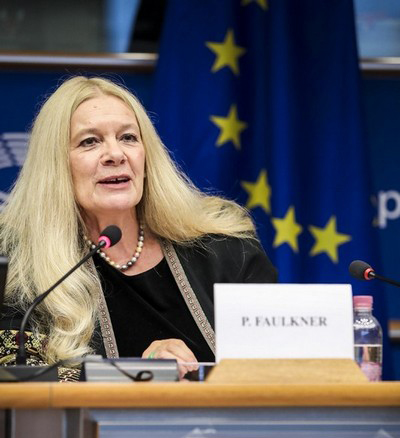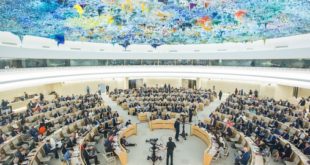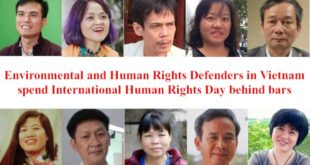3rd December 2019, European Parliament, Brussels, Room A5G315

May I extend warm thanks to MEP Julie Ward for hosting this meeting, and to all those attending. I would like first to apologise for Vo Van Ai, President of VCHR, who is unable to speak here today due to ill health. I will present the situation on his behalf.
VCHR has been working on Vietnam for many years. So, for us, the current EU-Vietnam Free Trade Agreement (EVFTA) has a distinct air of déja vu.
In 1995, when the EC signed its first Cooperation Agreement with Vietnam, we were told that is was a breakthrough – it contained a “human rights” clause which would give Europe leverage to obtain concrete progress. Human rights would definitely improve once the agreement was in force.
In 2012, the Framework Cooperation and Partnership Agreement was signed. The Commission ensured Parliament that this was even better. Not only did it have a “human rights” clause, but also a “suspension clause”. If Vietnam committed grave human rights violations, the EU could cut off the trade deal – or at least take severe economic measures to put Vietnam back on track.
Today, as the EU is about to conclude one of the most ambitious Free Trade Agreements ever signed with a third country, the Commission is repeating the same refrain – Vietnam will improve human rights once EVFTA is signed.
For the first agreement, we were hopeful. For the second, we were doubtful. For the third, we are plainly not convinced.
Because we know now – as the Commission probably knew then – that there is no precedent of the human rights clause ever being invoked in trade agreements. As for the suspension clause, as the Commission itself has admitted, it will only be invoked in extreme cases such as a coup d’état.
We also know – and Hanoi knows too – that Vietnam can continue repressing its critics both during and after ratification. Because they know that, whatever they do, the Commission will cover them.
As proof, we will show you testimony today from a civil society activist in Vietnam. He warns the EU that more arrests will take place once the agreement is ratified. He says that those who criticise EVFTA will face arrest. Phạm Chí Dũng’s words proved tragically true, for he was arrested in Ho Chi Minh City only days after sending this appeal. He faces up to 20 years in prison.
How can the Commission defend Vietnam’s “good will” when it arrests a prominent critic only days before Parliament embarks on this critical phase of EVFTA/IPA negotiations ?
From the very start, the European Commission broke all the rules concerning EVFTA. It waived the “human rights impact assessment”, a mandatory prerequisite for all bilateral accords. Following a complaint filed by FIDH and VCHR, the Ombudsman declared this was “maladministration” and urged the Commission to carry out the assessment without delay. Nothing was done. On the contrary, negotiations continued at full pace.
In February 2017, a Delegation from the EP’s Human Rights Sub-committee, led by its President Pier-Antonio Panzeri, went to Vietnam. Alarmed by what they saw, and by testimonies from civil society activists with whom they met, the delegation declared that EVFTA should not be signed without significant progress in Vietnam. In 2018, the European Parliament passed an Urgent Resolution condemning human rights abuses and pressing for monitoring mechanisms in the Free Trade Agreement. Again, the Commission ignored the Parliament’s concerns.
What is most shocking is that EVFTA negotiations take place at a time of increasing human rights violations in Vietnam. Whilst rights abuses have always been bad, the situation deteriorated alarmingly in 2016, when the Communist Party appointed a new, hard-line leadership. The new government has zero-tolerance of dissent, and embarked on a brutal, nation-wide crackdown that continues unabated today. VCHR and our colleagues have reported regularly on these abuses at the EU-Vietnam human rights dialogues. The Commission cannot say they did not know.
Over the past three years, the authorities have harassed, assaulted and arrested bloggers, journalists, human rights defenders, religious followers, advocates of worker rights, land rights, women’s rights and the environment. Prison sentences have increased dramatically. For simple acts such as sending emails or taking part in demonstrations, activists are accused of “attempting to overthrow the government” and condemned to 15 – 20 years in jail.
At the same, despite recommendations by the UN, the EP and the international community, including three cycles of the Universal Periodic Review, Vietnam continues to adopt laws that restrict the exercise of human rights. The Law on Belief and Religion, the Press Law, Cyber Security Law, the Criminal Code, the Access to Information law – all include clauses condemning the “abuse” of freedoms to “threaten the interests of the state”. This loop-hole enables Vietnam to cynically claim that “there are no political prisoners in Vietnam, only people who violate the law”.
A snap-shot portrait: Vietnam today has the 2nd highest number of political prisoners in Southeast Asia (at least 200, a surge of 30% in 2018 according to Amnesty International); it is amongst the top five countries for use of the death penalty; it is almost last in RSF’s “World Press Freedom Index” (176th out of 180 countries), and the world’s sixth most-censored nation according to CPJ.
This not only an NGO assessment. In March 2019, the UN Human Rights Committee examined Vietnam’s report on its implementation of the International Covenant on Civil and Political Rights (ICCPR). The Committee observed that, 35 years after Vietnam’s accession to the ICCPR, there remained an “incompatibility between the domestic legal framework and the Covenant” and “overly broad restrictions on the Covenant rights, including, on the basis of national security”.
I would like to conclude with two points. First, the issue of worker rights. Vietnam has just adopted an amended Labour Code which allows workers to set up “representative organisations”, independent of the State-run Vietnam General Confederation of Labour (VGCL). This has been hailed as a great step towards freedom of association. But these are not free trade unions. To operate legally, they must obtain a licence from the “competent authorities” – which in Hanoi-speak, means approval from the Communist Party of Vietnam. In practice, the amended Labour Code repeats the model of the Law on Belief on Religion – creating an apparent framework to promote freedoms whilst increasing state management and control.
Lastly, there is a gulf between ratification and implementation. Vietnam speaks of ratifying ILO Conventions 87 and 105 in the distant future, between 2023 and 2025. But even if it does, when will it implement them? Vietnam acceded to the ICCPR over 30 years ago, yet human rights are still systematically violated today. How can we believe that EVFTA can improve this situation?
The European Parliament should not ratify EVFTA and IPA unless Vietnam demonstrates its commitment to human rights, beginning with the immediate release of Pham Chi Dung, and all those detained for their advocacy of human rights and democratic freedoms in Vietnam.
Thank you.
 Quê Me Quê Me: Action for democracy in Vietnam & Vietnam Committee on Human Rights
Quê Me Quê Me: Action for democracy in Vietnam & Vietnam Committee on Human Rights




